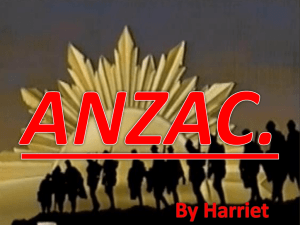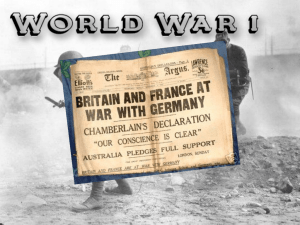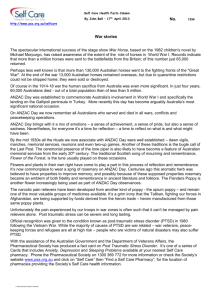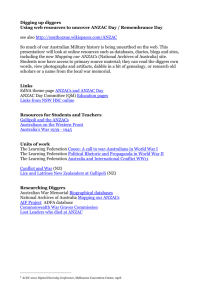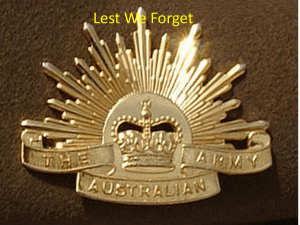lieutenant general david morrison, ao chief of the australian army
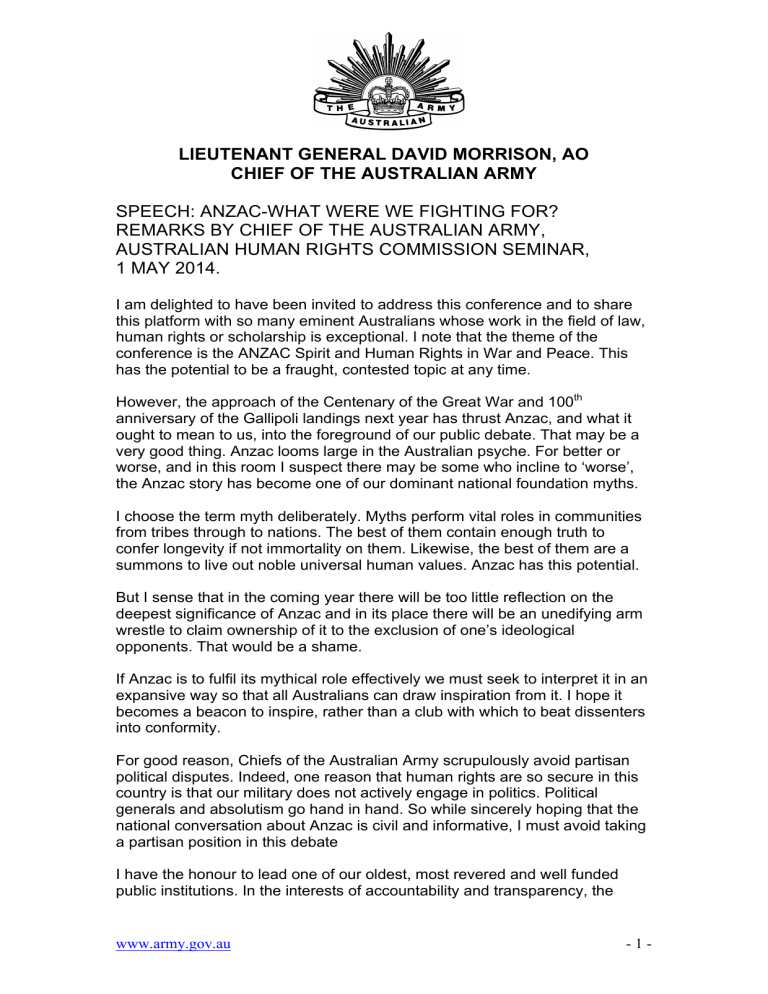
LIEUTENANT GENERAL DAVID MORRISON, AO
CHIEF OF THE AUSTRALIAN ARMY
SPEECH: ANZAC-WHAT WERE WE FIGHTING FOR?
REMARKS BY CHIEF OF THE AUSTRALIAN ARMY,
AUSTRALIAN HUMAN RIGHTS COMMISSION SEMINAR,
1 MAY 2014.
I am delighted to have been invited to address this conference and to share this platform with so many eminent Australians whose work in the field of law, human rights or scholarship is exceptional. I note that the theme of the conference is the ANZAC Spirit and Human Rights in War and Peace. This has the potential to be a fraught, contested topic at any time.
However, the approach of the Centenary of the Great War and 100 th anniversary of the Gallipoli landings next year has thrust Anzac, and what it ought to mean to us, into the foreground of our public debate. That may be a very good thing. Anzac looms large in the Australian psyche. For better or worse, and in this room I suspect there may be some who incline to ‘worse’, the Anzac story has become one of our dominant national foundation myths.
I choose the term myth deliberately. Myths perform vital roles in communities from tribes through to nations. The best of them contain enough truth to confer longevity if not immortality on them. Likewise, the best of them are a summons to live out noble universal human values. Anzac has this potential.
But I sense that in the coming year there will be too little reflection on the deepest significance of Anzac and in its place there will be an unedifying arm wrestle to claim ownership of it to the exclusion of one’s ideological opponents. That would be a shame.
If Anzac is to fulfil its mythical role effectively we must seek to interpret it in an expansive way so that all Australians can draw inspiration from it. I hope it becomes a beacon to inspire, rather than a club with which to beat dissenters into conformity.
For good reason, Chiefs of the Australian Army scrupulously avoid partisan political disputes. Indeed, one reason that human rights are so secure in this country is that our military does not actively engage in politics. Political generals and absolutism go hand in hand. So while sincerely hoping that the national conversation about Anzac is civil and informative, I must avoid taking a partisan position in this debate
I have the honour to lead one of our oldest, most revered and well funded public institutions. In the interests of accountability and transparency, the www.army.gov.au
- 1 -
public deserve to hear from me occasionally, albeit sparingly, on how their funds are being spent and what steps I am taking to ensure that their sons and daughters are being equipped to survive in dire peril.
On occasions I have spoken in public about what the changing character of war and the shifting global balance imply for the structure of our Defence
Forces. However, opportunities such as today’s are most welcome.
Again, some of you may think that the Chief of the Army may know something about Anzac, but precious little about human rights. Hopefully, I may have gone some way to disabusing you of that notion over the past couple of years.
With the support and advice of people of influence such as Elizabeth
Broderick, I believe that we are making enormous improvements to the environment in which our people serve.
Military life, by its very nature, demands some curtailment of one’s human rights. Preparation for war is a demanding and harsh business. But training is never a guise for abuse, especially sexual assault. And in so far as any one seeks to invoke some legendary digger myth, allegedly derived from Anzac, to justify degrading their colleagues, they have no place in the Army. I trust that I have made that abundantly clear.
While I have sought to stamp out abuse and bullying disguised as training, I have not done this in pursuit of any human rights accolade. I am merely doing my job, though most assuredly with genuine conviction.
Moreover, every decision I have made to enhance the role of women in Army or to eliminate unacceptable discrimination against women, has been taken with a professional eye to improved capability. I am not a crusader, though if I have done some good in seeking to improve the operational effectiveness of the Australian Army then I am delighted.
With that caveat firmly in place then, I believe that I come to debates on human rights with what equity lawyers would term ‘clean hands.’ As a professional soldier I tend towards pessimism about the innate human proclivity for violence. I am also a foreign policy realist. The Wilsonian moment which beckoned after the fall of the Berlin Wall and the removal of
Milosevic proved to be all too fleeting.
As recent events in the Ukraine and Syria amply demonstrate, those who wish for peace still need to prepare for war. Or as George Orwell so eloquently put it, “We sleep safe in our beds at night because rough men stand vigil in the darkness to visit violence on those who would do us harm.”
What does this have to do with Anzac? Well quite a lot actually. Over the next year a host of people will ask why we fought at Gallipoli. If the press commentary of the past few days is any guide, some observations will contain a degree of rancour, while others will tend to invoke a level of nationalistic sentimentality, regardless of the ideological view of those espousing them. I www.army.gov.au
- 2 -
trust you will not accuse me of ducking the issue when I say that I have little patience with either extreme in this debate.
Some regard any criticism of the Anzacs as a form of treason. This is actually immature and unhelpful. The Anzacs justifiably will continue to be revered.
But those who use their service to bludgeon conformity to a narrow ideal of what an Australian, especially an Australian soldier, should be, deliver harm not homage to Anzac. If Anzac is our most potent national myth, and I believe that it is, then it must be inclusive and expansive. It must offer intangible and universal values to all Australians. Fortunately I believe it is capacious enough to achieve this.
The most pervasive distortion about what really happened in Turkey in 1915 is that the Aussie bloke is a natural soldier. That notion is incredibly unhelpful to those who are responsible for raising, training and sustaining credible military forces. War is a brutal, nasty business, Hobbesian in every regard except any propensity to being short.
Creating and developing small teams that are capable of surviving the shock of battle and which in turn can continue to fight effectively is a demanding, unglamorous business. The myth of the gifted amateur is the most dangerous which the romantics propagate.
In simple terms it would be the equivalent of every cricket coach telling their kids that it was Doug Walter’s smoking and drinking that made him a great batsman. The reality is that all our elite sportsmen and women live ascetic lives. Yet there is a tendency to focus on the blokey larrikin to the exclusion of all others in all forms of endeavour.
Lest I be misinterpreted, be assured that I, like every single Australian soldier, am fiercely proud of Anzac. We are all acutely aware that we wear the same distinctive slouch hat and Rising Sun badge immortalised by those men. It is a great honour and subtly defines our values of courage, teamwork, initiative and respect for one another.
Moreover, every nation and every Army needs a foundation myth from which to draw resilience and a sense of identity. Ours is a noble one. It venerates courage, self-sacrifice, and daring tempered by stoicism. These are innate human virtues. But I can assure you that in today’s Army they are not the exclusive province of lantern jawed country boys. Every Australian soldier aspires to them, men and women alike as well as those whose forebears were in the AIF and those whose parents were not born here.
Again, some of the more bellicose enforcers of conformity to the myth of the hard-drinking larrikin berate serious military historians for questioning our combat performance. But those comforted by fairy tales in lieu of history miss the vital point that the AIF was an adaptive, learning organisation which became increasingly lethal over the duration of the war. Our mastery of combined arms warfare reached its apotheosis under Monash in the battles of
1918. www.army.gov.au
- 3 -
The Anzac landing was not our finest hour. And that is not a slur on the bravery and élan of those who stormed ashore on that awful morning. It is merely a hard headed acknowledgement that we sent that force away woefully prepared and they paid the price for our national neglect of defence.
Among those who went ashore on 25 April, and right through that campaign, were some very fine soldiers. But just as in any army, in any war, some failed.
They lost their nerve. They shunned combat or they made professional errors.
It is an inevitable aspect of war, which serious armies rigorously analyse and seek to improve on.
Conversely, others of a different ideological persuasion lament our involvement in every war other than the immediate defence of Australia in the
Pacific War. Even then there is a small clique that thinks we forced Japan into that war as well - an idea so daft only the poorest student of history could believe it.
They invoke a version of what I saw recently referred to as the alienated
‘poetic view’ of war espoused in the poems of Sassoon and Owen and other anti-war poets. War is not only brutal it is futile. To these critics the band continues to Play Waltzing Matilda down by the quay and our soldiers cannot make any ethical case for their sacrifice.
Rather, our soldiers are invariably dupes of the global capitalist and imperial systems. They sleep walk off to ‘other peoples’ wars’ and die for obscure reasons. This portrays them as victims without the volition to volunteer for a cause. As a foreign policy realist, I have even less sympathy for this calumny than the ‘natural soldier’ nonsense.
If one strand provides a coherence to every one of our foreign military commitments it is this; we have deployed naval, military and air forces to support a benign global order, which best reflects our values and aspirations as a liberal democracy, whenever that order is imperilled.
At this risk of sounding like Jack Nicholson’ Colonel Nathan Jessop in the film
A Few Good Men , conferences like this one are held exclusively in societies which have developed human rights frameworks under the blanket of security provided by the great liberal democratic maritime powers of the past three centuries, Great Britain and the United States. We convene today because men, and in increasing numbers, women stand on the frontiers of the world in which human rights are enforceable and must be defended.
The ideals of the Enlightenment have flourished under the maritime supremacy of those two great liberal maritime powers. Indeed, since the
Seven Years War concluded in 1763, some combination of those powers has been willing to fight to prevent Europe falling under the sway of any rising continental militarist power. Both global conflagrations of the 20 th Century conformed to this schema with land locked Germany seeking to achieve hegemony over Europe. www.army.gov.au
- 4 -
And I am unequivocal in asserting that we were on the right side both times in those wars, both for idealistic and pragmatic reasons. As a prosperous medium sized power, inextricably linked into the global trading system, and reliant for our very survival on the freedom of the global commons, we have always sided with the dominant liberal democratic power of the day.
Australia could never secure its own sea lanes even if we distorted our economy by adopting a permanent war footing on defence expenditure. We have flourished amid a global order for which we could never have provided for ourselves.
The deployment of our forces to the Dardanelles and to the Western Front represented a clear-headed recognition that the defeat of Great Britain and
France by Imperial Germany would carry grave consequences for Australia.
I should hope that I need not labour the point as to worthiness of our war aims against Nazi Germany and Imperial Japan. Rather than providing cannon fodder for Etonian fops to squander, or guileless lambs to the slaughter, the
Anzacs, like every Australian expeditionary military contingent since, served our national interest by fighting for the preservation of a rules based international order.
On a day devoted to the advancement of humans rights, I also believe it is essential to treat the Anzacs as human beings. Only by standing in their shoes and looking at the world through their eyes can we truly comprehend their motives.
I believe that my analysis of our strategic history is correct. But every one of those soldiers who embarked for exotic lands in 1915 arrived at a deeply personal decision. It is ahistorical, and demeaning to them as human beings, to project our own values and motives on to them.
Firstly they were Empire men. A significant number had either been born in
Britain or had kin folk there. They inhabited a world in which duty to the Crown and the Empire were honourable and instinctive impulses.
Moreover, they were citizens of a new country. Fears about invasion and security loomed large in their minds. Indeed, the quest for a common defence was one of the primary motives of our those who formed the Commonwealth.
On Anzac Day this year, I stood on the battlements of a fort built in 1890 on
Thursday Island, in the Torres Straits, by the Government of Queensland to deter Russian incursions. And our first casualties of the Great War did not occur at Gallipoli but rather much closer to home when a joint amphibious task force seized the German radio station at Rabaul on our doorstep.
To me those inescapable realities highlight the intellectual poverty of the emotive arguments of both the left and right about Anzac, the Great War, indeed about Australia at war in general. War is a ghastly business - make no mistake. As Douglas MacArthur observed in his final oration, soldiers know www.army.gov.au
- 5 -
this only too well as they suffer the deepest privations of war. But war has been the engine of human history. As Clausewitz noted, policy often advances behind an armed phalanx.
Acknowledging the truth of this gives me no joy. But the most basic human right is a right to physical security and safety. And sadly, even in the sophisticated world of the 21 st Century, soldiers more often provide it than do jurists. www.army.gov.au
- 6 -
